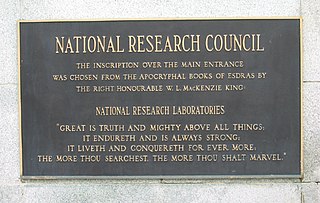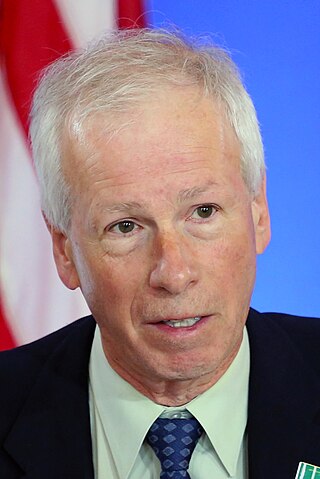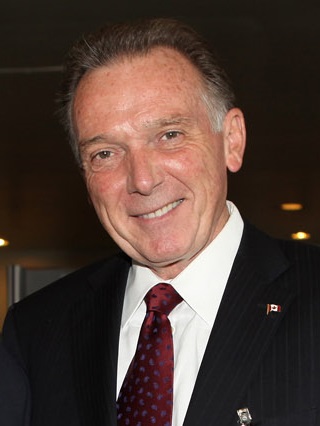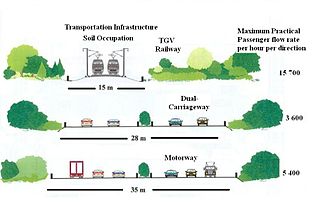Related Research Articles

The National Research Council Canada is the primary national agency of the Government of Canada dedicated to science and technology research and development. It is the largest federal research and development organization in Canada.
The Wuppertal Institute for Climate, Environment and Energy is a German research institution for sustainability research, focusing on impacts and practical application. It explores and develops models, strategies, and instruments to support sustainable development at local, national, and international levels. Research at the Wuppertal Institute focuses on ecology and its relation to economy and society. Special emphasis is put on analyzing and supporting technological and social innovations that decouple the prosperity of economic growth from the use of natural resources. The organization's activities focus on developing transformation processes aimed at shaping a climate-friendly and resource-efficient world.

John Russell Baird is a retired Canadian politician. He served as Minister of Foreign Affairs from 2011 to 2015 in the cabinet of Prime Minister Stephen Harper. He had been a member of the federal cabinet, in various positions, since 2006. Previously he was a provincial cabinet minister in Ontario during the governments of Premiers Mike Harris and Ernie Eves. Baird resigned from Harper's cabinet on February 3, 2015, and as a Member of Parliament on March 16, 2015.

David Joseph McGuinty is a Canadian lawyer and politician who has served as the Member of Parliament for Ottawa South since 2004. He currently serves as the first chair of the National Security and Intelligence Committee of Parliamentarians, an executive agency allowing legislator oversight of the Canadian intelligence community.

Stéphane Maurice Dion is a Canadian diplomat, academic and former politician who has been the Canadian ambassador to France and Monaco since 2022 and special envoy to the European Union since 2017. Dion was Leader of the Opposition and the leader of the Liberal Party from 2006 to 2008. He served in cabinets as intergovernmental affairs minister (1996–2003), environment minister (2003–2006), and foreign affairs minister (2015–2017).

Gary T. Goodyear is a Canadian politician. He was a member of the House of Commons of Canada from 2004 to 2015, having been elected to represent the riding of Cambridge as a Conservative in 2004. On October 30, 2008, he was named Minister of State for Science & Technology within Prime Minister Stephen Harper's Cabinet. Goodyear was re-elected in the May 2nd elections in 2011 and returned to Stephen Harper's cabinet as Minister of State for Science & Technology. He was replaced in this capacity by Greg Rickford on July 15, 2013.

James Peter Kent is a former Canadian journalist and former politician who served as the Conservative Member of Parliament for the riding of Thornhill from 2008 to 2021. He served as Minister of the Environment in the government of Prime Minister Stephen Harper. Before entering politics, he was Deputy Editor of the Global Television Network, a Canadian TV network. He has worked as a news editor, producer, foreign correspondent, and news anchorman on Canadian and American television networks.

Connie Hedegaard Koksbang is a Danish politician and public intellectual. She was European Commissioner for Climate Action in the European Commission from 10 February 2010 through 31 October 2014.

Sustainable urban infrastructure expands on the concept of urban infrastructure by adding the sustainability element with the expectation of improved and more resilient urban development. In the construction and physical and organizational structures that enable cities to function, sustainability also aims to meet the needs of the present generation without compromising the capabilities of the future generations.
The Sustainable Development Commission (SDC) was a non-departmental public body responsible for advising the UK Government, Scottish Government, Welsh Assembly Government, and Northern Ireland Executive on sustainable development.
The environmental policy of the Stephen Harper government was implemented when Stephen Harper was the Prime Minister of Canada from 2006 to 2015, under two minority governments until 2011 when the Conservative Party of Canada won a majority in the 2011 Canadian federal election. During the term of Stephen Harper, Canada's greenhouse gas emissions decreased from 730 to 723 Mt of carbon dioxide equivalent. In contrast, during the period from 1993 until 2006, under various Liberal governments, Canada's greenhouse gas emissions increased 617 to 730 Mt of carbon dioxide equivalent.

Tim Jackson is a British ecological economist and professor of sustainable development at the University of Surrey. He is the director of the Centre for the Understanding of Sustainable Prosperity (CUSP), a multi-disciplinary, international research consortium which aims to understand the economic, social and political dimensions of sustainable prosperity. Tim Jackson is the author of Prosperity Without Growth and Material Concerns (1996). In 2016, he received the Hillary Laureate for exceptional mid-career Leadership. His most recent book Post Growth—Life After Capitalism was published in March 2021 by Polity Press.

The International Institute for Sustainable Development (IISD) is an independent think tank founded in 1990 working to shape and inform international policy on sustainable development governance. The institute has three offices in Canada - Winnipeg, Ottawa, and Toronto, and one office in Geneva, Switzerland. It has over 150 staff and associates working in over 30 countries.
Commuter Challenge is a national, week long event in Canada and is held annually during the Canadian Environment Week. Formatted as a friendly competition between workplaces and Canadian municipalities, the national and host city coordinators announce winners based on the highest percent participation. The event has a strong workplace focus where employers promote the event in-house to support their employees in leaving their cars at home in favour of more sustainable commuter modes including walking, jogging, cycling, in-line skating, public transit, carpooling and remote work.
The Jobs, Growth and Long-term Prosperity Act is an Act of the Parliament of Canada. This omnibus bill was introduced by Jim Flaherty, Minister of Finance under Prime Minister Steven Harper's majority Conservative government as a 2012 Budget Implementation Act. Bill C-38 was given Royal Assent on June 29, 2012. Bill C-38 and Bill C-45 attracted controversy both for their size and for the breadth of provisions contained that were not fiscally related. Elizabeth May, leader of the Green Party, claimed that, "[i]n spite of the fact that most Canadians have no idea how seriously Bill C-38 will affect their lives, the Senate is about to begin hearings so that Conservative Senators can vote on it as soon as possible... This railroading version of democracy is tragic for Canada."

The Canada West Foundation is a conservative non-partisan think tank based in Calgary, Alberta. It researches issues of concern in British Columbia, Alberta, Saskatchewan, and Manitoba and issues of national significance.
The Ministry of Environment and Protected Areas of Alberta is the Alberta provincial ministry of the Executive Council of Alberta responsible for environmental issues and policy as well as some, but not all, parks and protected areas in Alberta.

Catherine Mary McKenna is a Canadian lawyer and former politician who served as a Cabinet minister from 2015 to 2021. A member of the Liberal Party, McKenna was the minister of environment and climate change from 2015 to 2019 and minister of infrastructure and communities from 2019 to 2021. She was the member of Parliament (MP) for Ottawa Centre from 2015 to 2021, but decided not to seek reelection in the 2021 federal election.
Carbon pricing in Canada is implemented either as a regulatory fee or tax levied on the carbon content of fuels at the Canadian provincial, territorial or federal level. Provinces and territories of Canada are allowed to create their own system of carbon pricing as long as they comply with the minimum requirements set by the federal government; individual provinces and territories thus may have a higher tax than the federally mandated one but not a lower one. Currently, all provinces and territories are subject to a carbon pricing mechanism, either by an in-province program or by one of two federal programs. As of April 2024, the federal minimum tax was set at CA$80 per tonne of CO2 equivalent, set to increase to CA$170 in 2030.
Andrew Leach is a Canadian energy and environmental economist and a contributing writer to a number of Canadian news outlets including The Globe and Mail, and Maclean's. His research areas span energy and environmental economics—including topics such as oil sands regulation, clean energy innovations, with a specific focus on climate change policies.
References
- 1 2 "Environment panel's end blamed on support for carbon tax: Minister offers contradictory rationale for shutting down advisory panel". CBC News. The Canadian Press. 15 May 2012. Retrieved 4 January 2016.
- 1 2 3 McCarthy, Shawn (26 March 2013). "Tories accused of trying to bury climate research". The Globe and Mail. Archived from the original on 4 March 2016. Retrieved 4 January 2016.
- ↑ Scoffield, Heather (26 March 2013). "Environment roundtable's web plan nixed". The Chronicle Herald. The Canadian Press. Retrieved 4 January 2016.[ not specific enough to verify ]
- ↑ Reflections from Past Leaders of the NRTEE. Ottawa: National Roundtable on the Environment and the Economy (Canada). 2013. ISBN 978-1-100-21765-9 . Retrieved 18 June 2021.